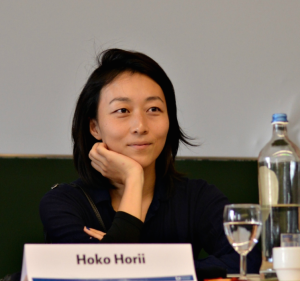One of our staff members is contributing considerably to a News Archiving service at Mu. Any well educated (Masters, PhD or above) users who wish to make comments on news sites, please contact Jim Burton directly rather than using this list, and we can work on maximising view count.
Hoko Horii

Hoko Horii is assistant professor at the Van Vollenhoven Institute for Law, Governance and Society (Leiden Law School) in the Netherlands, and a post-doctoral fellow at Kobe University, Japan. She studies the concept of agency in law, by examining the background and practice of ‘age of consent’ laws in three countries: Japan, Indonesia, and the Netherlands. Her research has involved fieldwork interviewing people who married when considered "children" by international definitions (i.e. under 18 years of age). Her research challenges the widespread international framing of youthful marriage as forced unions where the younger party lacks agency.
Her 2020 PhD thesis is provocatively titled "Child marriage as a choice: rethinking agency in international human rights". The following year her book Child Marriage, Rights and Choice: Rethinking Agency in International Human Rights (Routledge, 2021) was published.[1] For more of her work, see the following:
- Horii, H. (2020). Walking a thin line: Taking children’s decision to marry seriously? Childhood, Vol. 27(2): 254–270.[2]
- Abstract: "This article provides empirical evidence on children’s agency and capacity in making the decision to marry. Case studies from my fieldwork in Bali contrast the commonly represented image of child marriage as a forced marriage, by demonstrating that in many cases children themselves make the decision to marry. However, considering social power dynamics, is such a decision really the child’s? The analysis shows that the current international child marriage framework fails to walk the thin line between empowerment and protection of children. Policies instead should be designed to encourage their participation in decision making and stimulate their resilience in their life after marriage."
- Horii, H. (2024). The Limits of Sexual Autonomy for Minors: Debating Age of Consent Laws InterGentes: The McGill Journal of International Law and Legal Pluralism, Online publication (Unpaginated).
- Abstract: "Sexual freedom is regarded as a fundamental right that is essential for the development of personal autonomy. Yet, when it comes to childhood sexuality, this freedom seems to become less clear-cut. While the Convention of the Rights of the Child affirms children’s negative freedom (protection from sexual abuse and exploitation), it does not address their positive freedom (the freedom to engage in sexual activity). The reservation stems from the belief that children, not fully developed, lack the capacity to make informed decisions and can be easily influenced by older individuals who possess greater knowledge and power.
- This paper explores the debates surrounding age of consent laws and legal cases involving ‘child sexual abuse’, particularly those cases where the minor party appears to be consenting. These limitations on adolescents’ sexual freedom are often justified based on the concept of harm, which is identified either as collective harm or foreseeable harm in the future. This paper provides evidence of a moralistic tendency to punish ‘deviant’ behavior that violates prevailing moral norms, even when harm is not evident."
- Mies Grijns and Hoko Horii, 'When do 'children' become 'adults'?: Transitions in children's rights and child marriage, in Children's rights in crisis Multidisciplinary, transnational, and comparative perspectives, ed. by Salvador Santino F. Regilme (Manchester University Press, 2024).[3]
- "In Indonesian society, children are no longer considered children when they marry, because then they start their own family and have to carry responsibilities as a husband/wife or father/mother. The transition is not just about physical age, but also includes mental maturity—dakil baligh. We find that there is a similar concept in global children’s rights discourse: evolving capacity. The idea is to acknowledge that children are and should be able to decide on their own according to the development of their cognitive capacity. It proposes to assess the decision-making by children not just in terms of physical age, but also in terms of cognitive capacity that gradually develops and individually differs. This principle is crucial for the realization of the rights of young adolescents who are transitioning into “adults.” However, the current global children’s rights/human rights regime tends to lean toward a paternalistic and protectionist approach (Cantwell 2016; Hopgood 2017) by setting a threshold between children and adults, and their cognitive ability, of eighteen years of age. Within the current regime, this principle of “evolving capacity” is difficult to implement in practice, and is perhaps the most unfulfilled aspiration in children’s rights (Lundy 2007; Shier 2001; Tisdall 2017; Tobin 2015; Varadan 2019). We might say this is a silent crisis of rights for young adolescents."
Relevant publications
- Horii H. (2018). Child marriage, not all alike. Inside Indonesia.
- Grijns, M. and Horii, H. (2018). Child Marriage in a Village in West Java (Indonesia): Compromises between Legal Obligations and Religious Concerns. Asian Journal of Law and Society, Vol. 5(2): 453-466.
- Horii H. (2019). A blind spot in international human rights framework: A space between tradition and modernity within the child marriage discourse. The International Journal of Human Rights, 24(8), 1–23.
- Horii H. (2019). Pluralistic legal system, pluralistic human rights? Teenage pregnancy, child marriage and legal institutions in Bali. The Journal of Legal Pluralism and Unofficial Law, 51(3), 292–319.
- Horii H. (2020). Legal reasoning for legitimation of child marriage in West Java: Accommodation of local norms at Islamic courts and the paradox of child protection. Journal of Human Rights Practice.
- Horii, H. (2021). Child Marriage as a ‘Solution’ to Modern Youth in Bali. Progress in Development Studies, Vol. 20(4).
- Horii, H. (2024). Law's drawing line: Legal discourse of consent in child sexual abuse cases in Japan, Children & Society, 38(6), 2052-2070 (Open Access).
